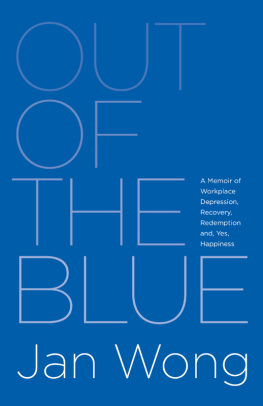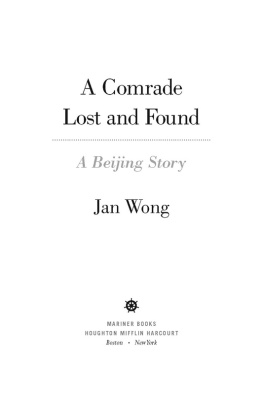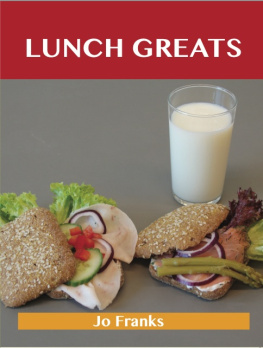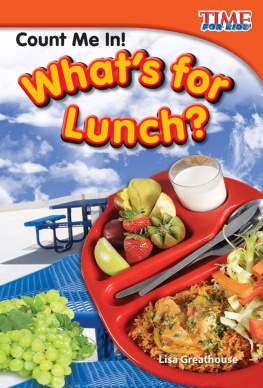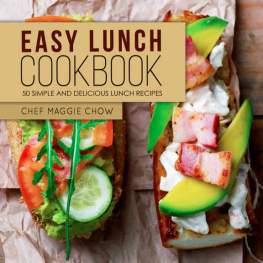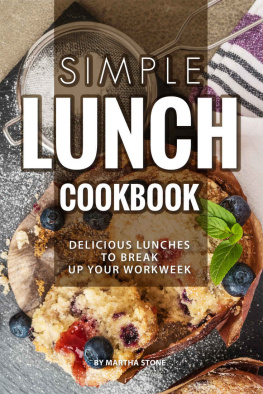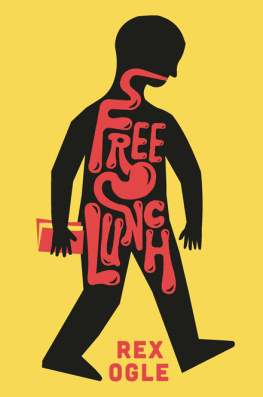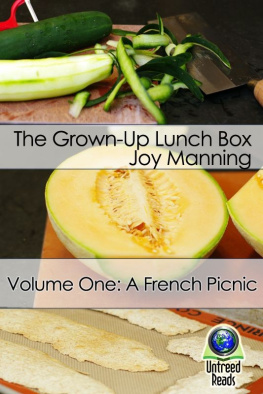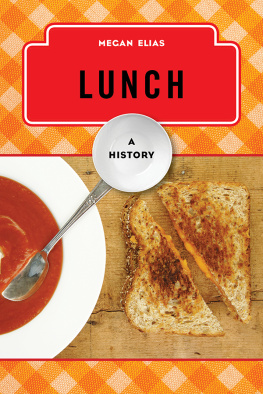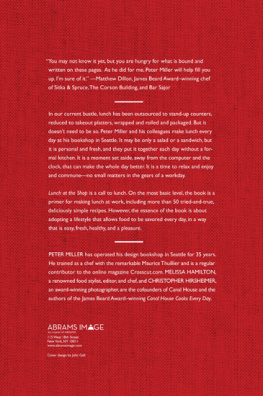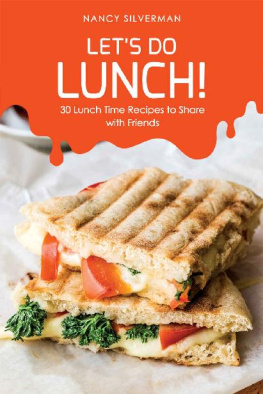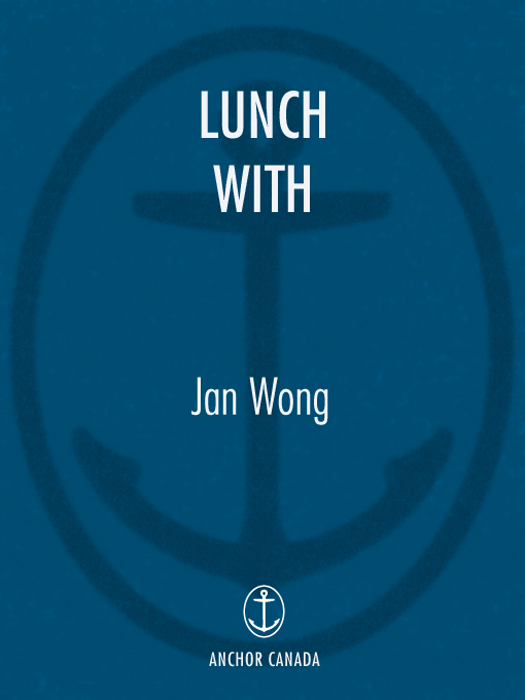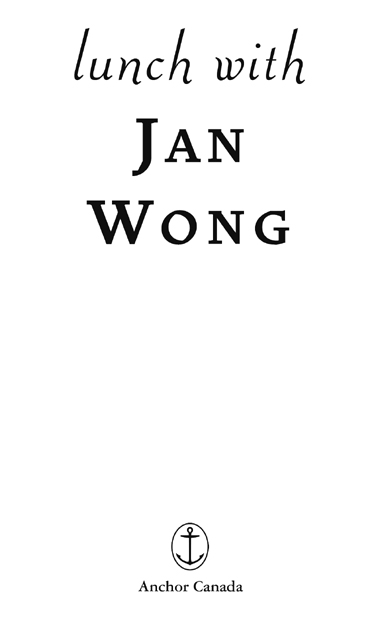A LSO BY J AN W ONG
Red China Blues: My Long March from Mao to Now
Jan Wongs China: Reports from a Not-So-Foreign Correspondent
Copyright Jan Wong 2000
Doubleday Canada hardcover edition published 2000
Anchor Canada paperback edition published 2001
All rights reserved. The use of any part of this publication, reproduced,
transmitted in any form or by any means electronic, mechanical,
photocopying, recording or otherwise, or stored in a retrieval system
without the prior written consent of the publisheror, in the case of
photocopying or other reprographic copying, a license from the Canadian
Copyright Licensing Agencyis an infringement of the copyright law.
Anchor Canada and colophon are trademarks.
National Library of Canada Cataloguing in Publication Data
Wong, Jan
Lunch with
eISBN: 978-0-385-67348-8
1. Celebrities Canada Interviews. 2. Celebrities Interviews. I. Title.
FC25.W636 2001 920.071 C2001-930560-5
F1005.W66 2001
Published in Canada by
Anchor Canada, a division of
Random House of Canada Limited
Visit Random House of Canada Limiteds website: www.randomhouse.ca
v3.1
To my mother, Eva Wong,
and my father, Bill Wong,
Montreal restaurateur
par excellence
I F
( WITH APOLOGIES TO R UDYARD K IPLING )
If I were dressed in Armani
And coiffed with lan,
If my bons mots were
Quoted and doted upon,
If my gestures and carriage
Bespoke a great style,
If I showed no emotion
Beyond my sweet smile,
If my actions were selfless
My mind chaste and pure,
If my causes were worthy
And trs, trs du jour,
If I knew that I never
Did anything wrong,
Then, only then,
Would I Lunch with Jan Wong
Jeanie Davis, Toronto
Letter to The Globe and Mail,
November 17, 1997
contents
the importance of lunch
H OW WOULD YOU LIKE TO TAKE M ARGARET A TWOOD
TO LUNCH ?
It was just before Labour Day weekend, 1996. My editor called me at home, presumably because I was the only one not on my way to the cottage. After turning down an interview with The Globe and Mail, Margaret Atwood had changed her mind. The Queen of CanLit would now deign to meet me for lunch.
All that weekend, I read Alias Grace, Atwoods new novel. On Tuesday morning, I was so nervous that I went early to Arlequin, her favourite neighbourhood restaurant. I wanted to ensure everything was just right: the best booth in the no-smoking section (because Atwood didnt smoke) and a large bottle of mineral water (in case she arrived thirsty). For myself, I ordered pita bread to nibble on while I scribbled notes.
Afterward, I wrote the standard famous-author interview with its invisible journalist. My editor, Cathrin Bradbury, asked for a rewritein the first person. We want the readers to feel as if theyre right there sitting with you, she said.
Atwood had given me one hour, an eternity on television but barely adequate for print. So I added attitude and atmospherics. I described how Atwood wanted to switch to another, quieter table even though at 11:30 a.m.her designated timewe were Arlequins only customers. I wrote about her refusal to order lunchI cant talk while Im eatingeven though a lunch interview was her idea. I recorded how she blanched when asked about her Pelee Island cottage, as though rabid fans would rent boats and circle the place.
Readers loved it. And the Atwood interview became the prototype for Lunch With, a weekly column in The Globe and Mail.
The experience taught me an important lesson: how celebs behave can be more interesting than what they say. For Better or For Worse cartoonist Lynn Johnston was hypercritical of our Old Spaghetti Factory waitress, to the point of filling out a scathing comment card. It made me wonder how she behaved when there wasnt a reporter present jotting down every muscle twitch. Many lunches later, I realized Johnston and Atwood were afflicted by celebrityitis, a rare condition characterized by an avowed desire for privacy while actively participating in a national publicity tour.
In a letter to the editor, Barbara Dawn Salo wrote, Jan Wong is the Diane Arbus of journalism. Absolutely everyone is a freak to her. She strips her subject buck naked and shoves her camera very, very hard into their flesh. The resulting picture is twisted, a distortion of reality. In another letter to the editor, Roselyne Campbell disagreed: Some people may think her writing is spiteful, but I thoroughly enjoy her sense of humour. She writes with a frankness and honesty I find most refreshing.
I figured Lunch With would last six months.
Before absolutely everyone wised up, I was determined not to pull my punches. If the emperor wore no clothes, thats what I would report. Readers quickly grasped that this was the naked lunch. Youd think Id never eat Lunch in this town again. But nearly four years later, the publicists still call. Celebrities apparently believe that public-relations maxim: theres no such thing as bad publicity.
Some colleagues consider Lunch a dream job: gorging among the gorgeous and the great. Others consider it a humiliating comedown from my previous posting as The Globes Beijing bureau chief. Two years into the column, one reader, Dr. Max Himel, wrote me a long letter calling it terrible, dreadful, and too cute for words. He added that he regretted he could not accept an invitation to lunch. I have never been able to develop a taste, he wrote, for hemlock tea.
Personally, I see Lunch as a logical career move. My six years overseas as a foreign correspondent taught me to poke holes in the well-constructed faade. And before China, I dealt with armies of publicists in my eight years as a business reporter (shipping, banking, financial services). Totalitarian dictatorships everywhere have humongous P.R. machines. At the Bank of Boston, for instance, it was called Corporate Communications. In China, its called, and Im not kidding, the Ministry of Propaganda. My years in China toughened me for the celebrity beat. After witnessing the 1989 Tiananmen Square Massacre, Im only mildly unnerved by a celebrity hissy fit.
Now and then, for relief from the self-obsessed, Ill take a noncelebrity to Lunch. They have included a beggar, a mentally handicapped woman, and my own Aunt Ming. Occasionally, noncelebrities propose, ahem, themselves. Many are struggling artists or tenured academics. Then there was the caller who said, Im a Boring White Male. You havent done that category. Why dont you take me to Lunch? I passed.
Over time, it has dawned on a few celebs that there is no such thing as a free Lunch. Refuseniks include Hilary Weston, Martha Stewart, Howard Stern, Jesse Helms, and Ross Rebagliati, the Olympic snowboarder who nearly lost his medal for smoking marijuana secondhand. But the majority accept an invitation to Lunch because they have something to sell. Theyre pushing their book, movie, or political party. Theyre flogging their bank merger, television show, or pay-per-view service, such as the one where you commune with your dead child for only $200 U.S. These celebs know they need free ads because the public is far too skeptical about paid ones. Hence the far-flung publicity tour, in which journalism becomes handmaiden to marketing.


